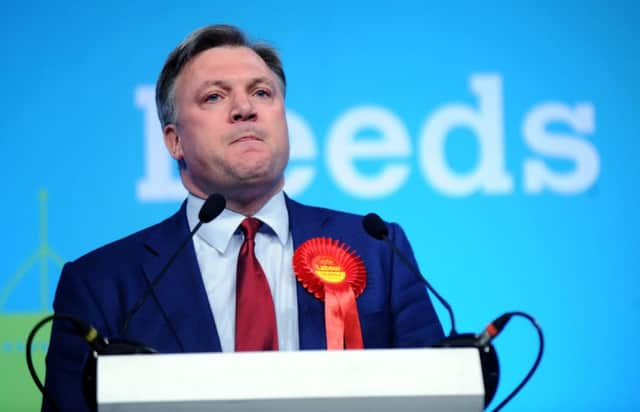Labour warned it faces decades in the wilderness


As Ed Miliband announced his resignation, Labour figures such as former deputy leader Roy Hattersley warned the party not to rush into any rash decisions following its decisive defeat, which he said was a “disaster”.
In his resignation statement, Mr Miliband said he took “absolute and total responsibility” for the result, which came at the end of a campaign in which he had repeatedly said he was “ready” to become Prime Minister.
Advertisement
Hide AdAdvertisement
Hide AdMr Miliband offered apologies to big Labour beasts who were defeated, including shadow chancellor Ed Balls and Scottish Labour leader Jim Murphy.
He added: “Britain needs a strong Labour Party, Britain needs a Labour Party that can rebuild after this debate so we can have a government that stands up for working people again.
“And now it is time for someone else to take forward the leadership of this party. So I am tendering my resignation, taking effect after this afternoon’s commemoration of VE Day at the Cenotaph [in London].
“I want to do so straightaway because the party needs to have an open and honest debate about the right way forward, without constraint.”
Mr Miliband, addressing activists at a venue in George Street, Westminster, said: “We have come back before and this party will come back again.”
However, Lord Hattersley, who presided over two election defeats during eight years as leader Neil Kinnock’s deputy in the 1980s and 1990s, warned the party against repeating past mistakes.
Labour was gripped by internecine civil war about policy direction and bitter leadership contests during an 18-year period in opposition, losing four elections in a row to the Conservatives. Lord Hattersley, when asked about how the party should respond to its second successive general election defeat, said: “I’m against making a rushed response to what’s happened and think everything has to be done at the right time.
“It was a disaster, but it’s very sensible to make sure any response is dealt with in a calm way. The party needs time to think about what to do rather than rush into anything or make any mistakes.”
Advertisement
Hide AdAdvertisement
Hide AdMeanwhile, Labour MP and former minister Frank Field said the party was facing a “pretty devastating” crisis having failed to defeat the Conservatives after “the worst recession in human history”.
Mr Field, who served as welfare reform minister in Tony Blair’s government, said Labour had to draw the “correct and sensible conclusions” about key policies in areas such as the economy after its electoral defeat.
He said: “The problem was an inability to get ahead of the game and present ourselves as a credible force.
“To go down to a defeat of that size is pretty devastating after what has been the worst recession in human history.
“There appeared to be a failure to address very simple and obvious issues during the campaign, but now we need to make sure we draw the correct and sensible conclusions and don’t repeat the mistakes the party has made in the past.”
John Park, assistant general secretary of the Community union, which is affiliated to Labour, also warned against the party turning in on itself. He said: “We don’t want Labour to go back to the splits that raged within the party in the 1980s and helped keep us out of power for years.
Former Labour Home Secretary Lord Reid said that “changing the captain” would not necessarily improve Labour’s prospects.
“They [the public] thought we were on the wrong side of all the major arguments – our economic competence, on the question of creating wealth rather than just distributing wealth, on the question of immigration, on the question of reform of the public services,” he told the BBC.
Advertisement
Hide AdAdvertisement
Hide AdAnd former first minister Lord McConnell said his party had experienced a “catastrophic night” as he raised concerns about its UK election campaign tactics.
“I think the Labour strategy for this election was always going to end up in this situation,” he said. “The idea that we could poll between 30 and 35 per cent and pull off a victory was not going to work.”
Meanwhile, Labour’s deputy leader Harriet Harman said she would step forward as acting leader but a deputy leadership contest will also be required, after she added: “It is not my intention to stay on as deputy leader of the Labour Party when the new leader is elected.
“Therefore, I am announcing that I am stepping down as deputy leader – with my resignation taking effect when the new leader and deputy leader are elected.
“With a new leadership team in place, after what has undoubtedly been a serious defeat, the Labour Party will be best placed to be the strong opposition this country needs – defending our NHS and our public services, and fighting for fairness, equality and social justice.
“That determination will be all the fiercer in the face of this Tory government.”
A clutch of candidates are thought likely to stand for the Labour leadership – including frontbenchers Andy Burnham and Yvette Cooper, as well as newer faces such as shadow business secretary Chuka Umunna.
However, Labour backbencher John Mann said Barnsley Central MP and former soldier Dan Jarvis was the “obvious” candidate for party leader.